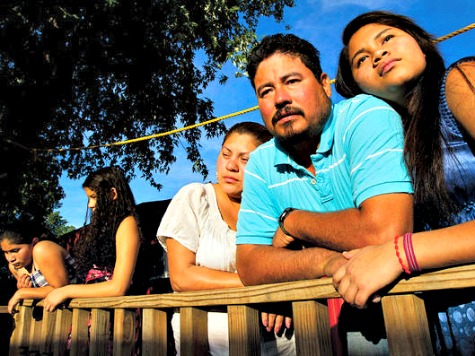
Hundreds of unaccompanied Latino children, some as young as three years old, who have crossed the U.S. border illegally, are having their immediate needs fulfilled at a new Catholic Charities center that opened June 11 near a bus station in McAllen, Texas.
Because of horrific conditions in Latin America coupled with President Obama’s decision to stop deportations of young illegal immigrants, 47,017 unaccompanied children were apprehended on the border from October through May, an increase of 92 percent from just one year ago, the National Catholic Register reports.
The new Catholic Charities facility is providing clothing, food, and personal items to the young illegal immigrants as they wait for federal agents to open their case files. A group of Catholic women have volunteered to bring in supplies and meet the children’s immediate needs. Volunteers must go through background checks and receive immunizations in order to provide care for the young Latinos.
“I’m so proud of my people,” said Ofelia de los Santos, who usually works as a prison-ministry volunteer in the Brownsville, Texas diocese. “I’m so proud to be Catholic.”
Federal immigration agents are trying to find social workers or relatives in Mexico willing to receive the children. Many, however, are sheltered privately in the United States. In the Brownsville diocese, 13 shelters are currently housing the young illegal immigrants. The two largest centers shelter up to 300 at one time. Similar facilities are developing in other states on the border.
Erica Dahl-Bredine, the El Salvador representative for Catholic Relief Services, said she has many children who have “fallen off the train,” referring to “El Tren de la Muerte,” or Death Train, a network of Mexican freight trains that has become the primary form of transportation for Central American and Mexican children fleeing treacherous conditions in their countries. Teens and younger children attempt to run and jump onto moving freight cars. Since many can’t pull themselves aboard, they fall and end up swinging instead onto the train tracks. As a result, some of the children are left with permanent, debilitating injuries.
“I see children who’ve lost limbs to the train and return home,” Dahl-Bredine said. “The couplings between the cars are notoriously dangerous. I see children who have lost an arm and a leg or both legs.”
Those illegal young immigrants who are able to make it onto the train have to then contend with notorious gangs and criminals who are being paid to protect them. The gangs recruit children as young as 10 years old, who find a sense of security and identity in the gang culture.
“I talk to girls who have been gang-raped by the smugglers,” said Dahl-Bredine. “I work with families who are looking for missing loved ones,” she adds about the children who never reach the U.S. border and are never heard from again.
Kristyn Peck, associate director of children’s services for the U.S. Bishops’ Children and Migration Office, said that, due to the gangs, there is no practical way for Americans to ensure safe passage for children traveling to the border. She believes Catholics should respond to this crisis.
“If you look at Scripture, Christ is a migrant. As a global Church, these are all of our children, and they come from countries that are mostly Catholic, Peck said. “As Catholics, we are well-equipped to respond.”
The Department of Health and Human Services (HHS) has announced a $350 million “funding opportunity” for residential care providers of the thousands of illegal minors crossing the U.S. border. Grantees will be expected to provide the young people with case management services, educational services, family reunification and release services, group and individual counseling, individualized needs assessments and service plans, information about free legal assistance available to them, medical and mental health services, family planning services, religious access, right to privacy, transportation, and visitation and phone calls. In addition, shelters awarded grants must deliver care in a manner that is “sensitive” to sexual orientation and gender identity.

COMMENTS
Please let us know if you're having issues with commenting.